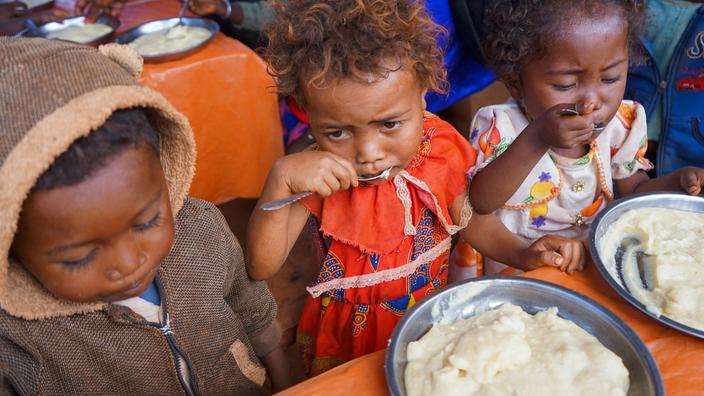
Global warming is not responsible for the famine in Madagascar
Contrary to United Nations statements, global warming has played only a minor role in the famine that has hit southern Madagascar, estimates a study published on Thursday, December 2, which raises questions about poverty and the natural variability of the climate.
Read alsoIn Madagascar, it was the first climate famine
The southern part of the Indian Ocean island is experiencing a drought unprecedented in decades, leaving more than a million people suffering from severe acute malnutrition. In June, the World Food Program (WFP) described this crisis as the first famine due to human-caused global warming. The dimension that the Malagasy authorities insist upon. “My country’s citizens bear the consequences of a climate crisis in which they did not participate”President Andry Rajoelina, insisted in November during COP26 in Glasgow.
But that’s not what the science says, according to the World Weather Attribution study, a network of scientists leading in attributing extreme events to climate change. During the last two seasons (2019-2020 and 2020-2021), the amount of rain was 60% less than normal in southern Madagascar. Such a rainfall deficit for 24 consecutive months (July 2019 to June 2021) has a 1 in 135 chance of occurring each year, according to WWA estimates. But based on observations and climate models, the probability of such an event is فإن Not significantly increased Researchers say because of rising temperatures.
Read alsoGlobal warming: Will entire countries disappear under water by 2050?
These findings are consistent with the assessment of the United Nations Panel of Climate Experts (IPCC) published in August. This report indicates that in Madagascar, the expected increase in droughts under the influence of warming should occur only at +2 °C compared to the pre-industrial era. However, at the moment, the world has risen by about 1.1 degrees Celsius. “Our results are not surprising (…) I was even more surprised by the fact that the United Nations described it as a famine caused by climate change”According to AFP, Frederic Otto of Oxford University.
It is important not to automatically assume that any calamity that occurs is related to climate change. “
Frederic Otto of the University of Oxford
Global warming is undoubtedly responsible for the increase in extreme weather events around the world, which are set to increase even more. Massive heat waves are increasingly being attributed to climate change. But for all the extreme events, “Climate change is one factor among others, sometimes significant, sometimes small, or not at all.”Frederic Otto insists. In this exact case, “If there is a portion of climate change, it is very little.”, confirms to AFP another author of the study, Robert Vautard, of the Institut Pierre Simon Laplace. Too small to be detected.
Read alsoWhat will be the impact of global warming on our children?
So the study suggests that the cause of this famine is drought associated with the chance of natural climate changes, and the weakening of one of the world’s poorest populations. In an area where rain is vital to subsistence farming and grazing, “It is difficult for local communities to cope with any prolonged drought”Study notes. “It is important not to automatically assume that any calamity that occurs is related to climate change.”Frederic Otto insists, stressing that global warming ‘Not the only driver of inequality’ In the world.
But just because this event is not attributed to global warming does not mean that it is not real. “They are still affected by severe drought for two consecutive years, with people having to leave their lands. A tragic situation”Robert Vautard insists. “And since we have relative confidence in the fact that droughts will increase in Madagascar at least from +2°C, it still leads to concern and an attempt to limit climate change.”, continued. in this context, “Addressing vulnerabilities in the region and improving living conditions is critical”For his part, Martin van Aalst, Director of the Climate Center of the Red Cross and Red Crescent.
Read alsoDoes global warming favor hurricanes?
Financing for adaptation to the effects of global warming is one of the most sensitive issues in international climate negotiations, with developing countries demanding more aid from rich nations to deal with climate change for which they are considered less responsible.

“Unapologetic pop culture trailblazer. Freelance troublemaker. Food guru. Alcohol fanatic. Gamer. Explorer. Thinker.”
